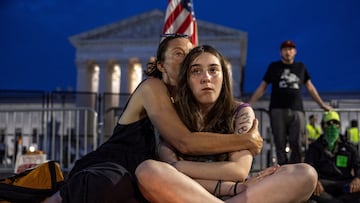Do you need to delete your period tracking app after the overturning of Roe vs. Wade?
In the new post-Roe world US women now find themselves in, concerns have been raised about data from menstrual cycle tracking apps being weaponized.

When the Supreme Court overturned the 1973 ruling in Roe v Wade, it didn’t come as a surprise, a draft of the 6-to-3 decision was leaked in May. Abortion is now illegal or severely limited in eleven states, while it could be the same in eleven others in the near future, creating an uncertain future for millions of women.
Concern has been raised about data from period-tracking apps being used to prosecute women suspected of getting an abortion. This has prompted calls for women who use these apps to delete them and any personal health data stored on the app.
Also see:
Privacy concerns existed before abortion ban
Apps that track a woman’s menstrual cycle gather deeply personal information. Typically users enter data like what day their flow started and stopped, along with how heavy it was and other bodily symptoms. But it can also include how often the user is having sexual intercourse for those trying to have a baby, if you are pregnant and if you’ve had a miscarriage.
Users should be aware that the data on these apps is not protected under the Health Insurance Portability and Accountability Act (HIPAA). This 1996 federal law places restrictions on healthcare providers sharing personal health information and medical records.
This means that they could share that information with third parties, which tech companies often do in order to improve their app or help advertisers better target consumers. Consumer Reports evaluated several period tracker apps in 2020, and additional apps after the Supreme Court draft ruling was leaked. Some provided no guarantee about not sharing data which additionally could be stored in the cloud making it vulnerable to hackers.
Period tracker data could be used in a criminal investigation
As trigger laws and latent pre-Roe bans on the law books go into effect across the United States making abortion a criminal act, an additional worry is now present. Law enforcement could access the data to prosecute women suspected of getting the procedure. “If ever there was a concrete example of the harms, boy do we have one,” Leah Fowler, research director at the Health Law & Policy Institute and research assistant professor at the University of Houston Law Center told Consumer Reports.
This would not be new, using digital activity data to build a case against people for a wide range of crimes from shoplifting to grand larceny and drug possession to trafficking has ample precedent. In the US “police and prosecutors conducted at least 50,000 extractions of digital devices between 2015 and 2019,” according to a 2020 University of Baltimore Law Review article.
Its not just menstrual cycle tracking apps that are of concern
Evan Greer, director of the digital rights advocacy group Fight for the Future told NPR that any app that is collecting data on your location could be used to build a case against someone suspected of getting an abortion. She gives the example of a woman playing a game on her mobile while sitting in the waiting room of a clinic that performs abortions.
Likewise, search histories and text messages could also be swept up in the dragnet. The law review article included two cases in which women were indicted of crimes against their fetuses based in part on text messages and online searches for information on abortion drugs.
Lydia X Z Brown, a policy counsel with the Privacy and Data Project at the Center for Democracy and Technology told NPR “Anybody could get their hands on this data by simply purchasing it from a company that is already collecting it.”
The threat of data collection is especially worrisome in Texas where a vigilante anti-abortion law known as SB 8, empowers private citizens to take anybody to court suspected of having, helping in the acquiring of and/or performing an abortion. The onus is on the accused to prove that they didn’t. This could be extremely difficult for a woman who has a miscarriage trying to demonstrate that its was natural and not self induced.






